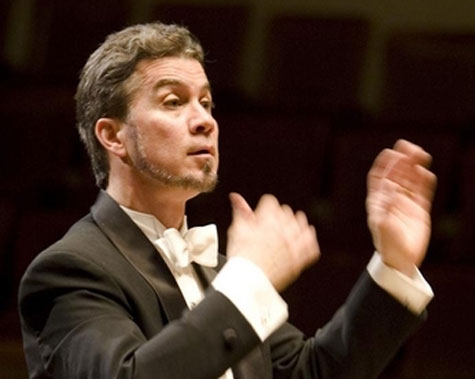
NEVER MIND THE SIBELIUS This was Nielsen that made you sit up and take notice. (Pictured: conductor Jonathan McPhee.) |
The last time I reviewed a Longwood Symphony Orchestra concert, we got Silvestre Revueltas’s Sensemayá, the Coronation Scene from Mussorgsky’s Boris Godunov, and Janácek’s Glagolitic Mass. Before that, it was Samuel Barber’s Night Flight and the Beethoven Ninth. One of the virtues of having so many “second-tier” orchestras in Boston, like the Longwood and the Boston Philharmonic (which just performed the Revueltas a couple of weeks back), is that we get to hear repertoire that doesn’t make it to the BSO. The members of the LSO are mostly area medical professionals, but they play like musical professionals, and they have one of Boston’s best conductors in Jonathan McPhee (who also directs the Lexington Symphony, the Nashua Symphony, and the Boston Ballet Orchestra).
The program last Saturday was Rachmaninov’s ferociously difficult D-minor Piano Concerto (a/k/a “Rach 3”), with British guest soloist Philip Edward Fisher, and Danish composer Carl Nielsen’s World War I–haunted Symphony No. 4, the “Inextinguishable.” The Rachmaninov is one of those “standard” pieces that doesn’t actually get played very often — Gabriela Montero did it with Benjamin Zander and the Boston Philharmonic last year, but BSO maestro James Levine is not known for Rachmaninov, and the last time I remember hearing this piece in Symphony Hall was way back when David Helfgott (the Shine pianist) was in town. As for Nielsen, he hardly turns up at all.
Challenging the conventional wisdom that you have to anchor your program with its biggest and most popular work, McPhee led with the Rachmaninov. Fisher, who was new to me, began with a forthright statement of the opening theme, but as the movement went on, the composer’s birch trees and snowflakes dissipated into a forest/snowstorm of banging, overpedaling, and quirky phrasing that veered between impetuous and inert. Fisher can play the notes — no small thing — and there were moments of melting poetry, as in his final solo statement of the second theme. But too often the orchestra was reduced to a blurry haze, with bloopy solos poking through now and again. I had the same impression when I heard Montero in this piece (in Harvard’s Sanders Theatre): the Boston Philharmonic’s otherwise idiomatic Rachmaninov sound kept, like the Longwood’s (when you could hear, there was some pretty decent playing), getting obliterated. I wonder whether Rach 3 as performed by a full orchestra and a powerhouse pianist simply isn’t too big for venues the size of Jordan and Sanders. Or maybe I needed to be sitting in the balcony.
The slow movement was closer to an Andante than the marked Adagio — interpretive license that would have worked better with more breathing room around Fisher’s relentless passion. The third movement didn’t improve till the end, when he cut through the orchestra with a singing rendition of the surging second theme (the one that Soviet-era pair skaters Ludmila and Oleg Protopopov made famous, at least in America). It’s the kind of moment that can redeem an entire performance. The audience didn’t think redemption was necessary — most everybody stood and whooped, perhaps hoping for an encore. That didn’t materialize — but even those who’d paid $40 (the top price) had got their money’s worth out of Fisher’s technique.